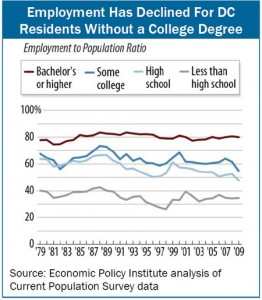The impact of the Great Recession in the District has been uneven, according to a new report from the DC Fiscal Policy Institute. Joblessness surged in 2009 for Latino and African-American DC residents and for those with less than a four-year college education, while employment remained relatively steady for white DC residents and those with a college degree.
The recession also contributed to a long-term decline in employment prospects for Black District residents and for residents lacking post-secondary education, even in periods when DC’s overall economy was growing. For these residents, employment levels now are close to the lowest levels in 30 years.
The report, Packing a Punch, which was featured in a news story in today’s Washington Post, found the following.
- Unemployment jumped fastest for Latino DC residents last year, from 4.7 percent in 2008 to 8.4 percent in 2009, an increase of three-fourths. Unemployment for Black residents was higher — 15.6 percent — though the rate of increase was not as high, while unemployment among white residents was 4.1 percent.

- Employment among DC residents with no more than a high school degree has fallen steadily since the late 1980s. The employment rate fell from 67 percent in 1988 to 48 percent in 2009, the lowest level in 30 years. (This is the share of adults with a job.) If employment had not fallen since the 1980s, some 15,000 additional DC residents would be working today.
- The 2009 employment rate for DC’s African-American adults was the second lowest level in 30 years.
The analysis indicates that the DC labor market has been growing further and further out of reach for all but the most-educated residents. This is not a problem limited to the recession or one that will go away when the recession ends. Tackling unemployment in the District ‘ a top goal for presumptive mayor Vincent Gray, will require a new, vigorous, emphasis on adult education and training. Equally important, it will require DC government to engage employers to hire DC residents’ through a mix of cajoling and support ‘ in ways it has not in the past.
